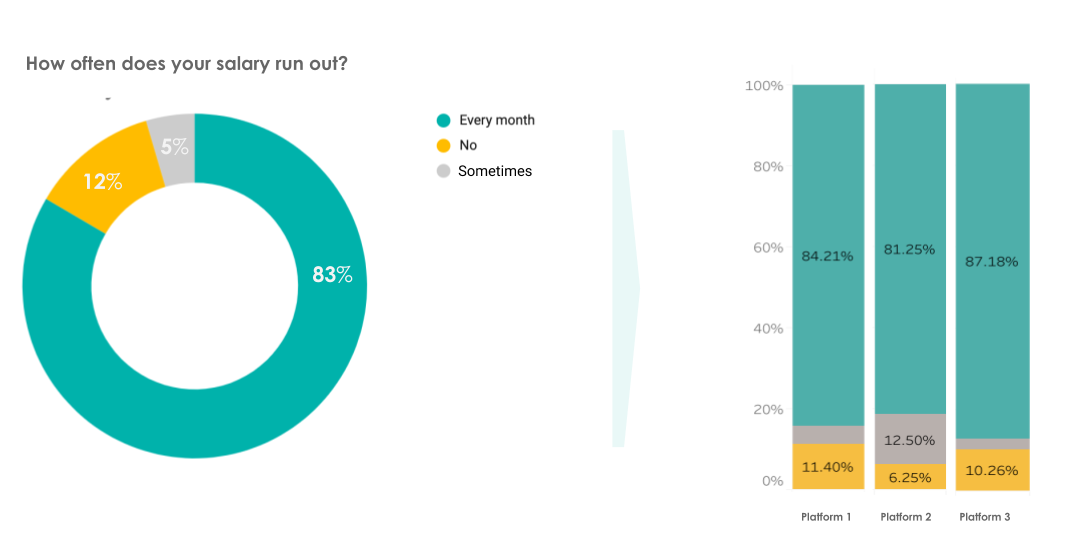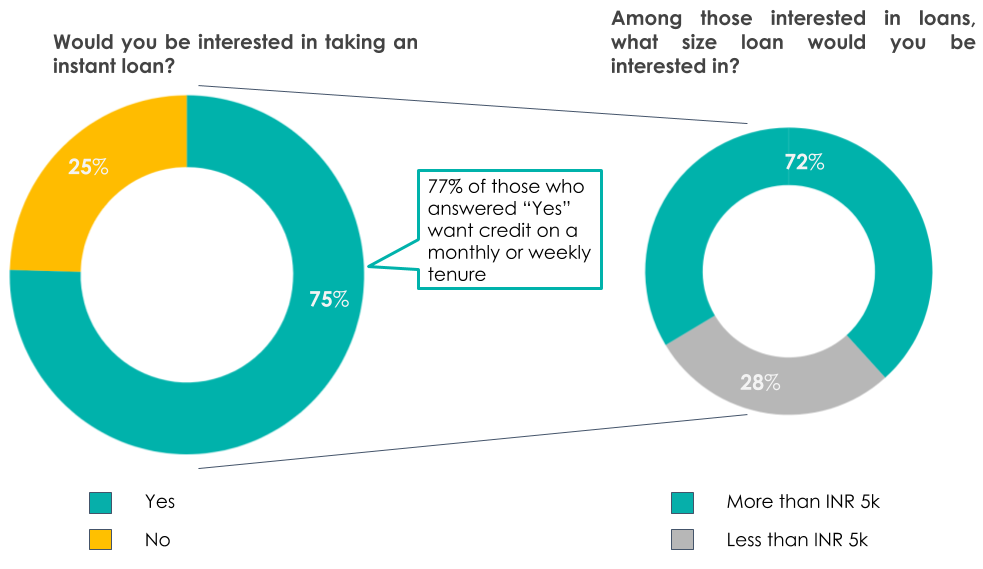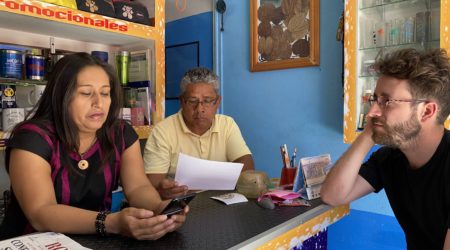Salary advances are helping gig workers in India make essential purchases during COVID-19
While some have worried that salary advances could undermine financial health, our research has found that they can help vulnerable families better match their income streams with their expenses. By allowing workers to access part of their earned wages before payday, salary advance providers help users secure much-needed, low-cost liquidity.
We recently surveyed over 170 users of Catalyst Fund portfolio company KarmaLife, which partners with gig work platforms to offer their workers flexible salary advances they can use to make transactions over a unified payments interface (UPI). Particularly given the volatility created by the COVID-19 lockdown, we found that advances are giving workers a valuable lifeline for managing expenses – especially purchase of airtime and petrol, which are essential for them to continue working. Karmalife users are free to use the entire available advance or a smaller portion, as only the amount used is deducted from their final income payout.
Gig workers are financially vulnerable
Digital gig workers often have somewhat-high income levels compared to non-digital, daily-wage workers like domestic workers or agricultural laborers. For example, several digital gig workers in India told us that they had bought land or were helping pay for family expenses, both suggesting some level of financial security.
Although incomes may be higher, these workers remain financially vulnerable given how unpredictable their incomes and expenses can be. In fact, workers told us their income often runs out before the end of the month, which was the case even before the pandemic.

Gig workers need access to liquidity to continue working. Unlike other vulnerable daily-wage or informal workers, digital gig workers need money to be able to access their work (much like farmers need capital for seeds, etc.). A gig worker without cash for airtime, petrol, car repairs, or insurance cannot work, thereby creating a sort of gig-work poverty trap. The ride-hailing drivers we spoke to echoed these worries, noting their concerns about paying for car insurance and license fees, as well as repaying car loans.
KarmaLife’s instant line-of-credit is a valuable source of liquidity for these essential expenses, both to extend salaries and to ensure workers can continue working. We found that Karmalife users are less likely to run out of cash before the end of the month. In fact, even a few months after signing up for KarmaLife, users are twice as likely to report not running out of money at the end of the month.
The pandemic has exacerbated financial vulnerability
Unfortunately, during downturns like the one presented by COVID-19, gig workers’ income streams can evaporate overnight, further increasing insecurity. Two years ago, a US report from 2018 found that most gig workers describe themselves as financially insecure, and almost 80% fear being unable to pay critical medical or emergency bills.
COVID-19 lockdowns have precisely exposed these exact financial vulnerabilities, as many gig workers report that their incomes have dropped dramatically, as work has slowed in most sectors. One worker told us:
Coronavirus has impacted my job and income drastically. Everything has gone during the lockdown, and there is no income at all.
While only a few estimated the magnitude of the drop, one noted that his income had dropped 50% while a few others estimated the drop at 20%. Flourish Ventures recently reported similar findings, noting that whereas 1 in 10 gig workers earned less than INR 15,900 (~$200) before the pandemic, 9 in 10 do so now. We found drops of this magnitude were more common among ride hailing drivers. Delivery workers faced smaller downturns, but nevertheless faced significant drops:
Before Covid we used to deliver 80-90 deliveries a day, but now the deliveries have decreased to 30-40. We used to get a minimum amount per delivery so my income has decreased. For example, I used to get an incentive of INR 2,500 for 70-80 deliveries, during sale days the incentives went to INR 3,000 or INR 4,500.
To make up for the drop in demand, gig workers note that they are working longer hours and looking to family for support.
Earlier, I used to work for 10 hours, now I have to work for 15-16 hours. Earlier, I used to have 15-16 rides, now only 7-8 rides per day.
Together, these financial pressures are taking a toll. Many gig workers report they are able to maintain essential spending but that savings and discretionary spending (e.g., for festivals) have come to a halt. Unfortunately, a few report that even essential costs like rent and airtime recharges are difficult to cover.
Like we are not able to pay rent on time, not able to recharge my phone with an amount of INR 500 so have to do a recharge of INR 200 now.”
Salary advances are helping to alleviate the pressure, but there is demand for more liquidity
Given these pressures, the low-cost, instant and recurring liquidity offered via the KarmaLife app has been a lifesaver for many. In particular, KarmaLife enables its users to better manage day-to-day expense volatility and mini emergencies in the days before their salary payout. It also makes it easy for workers to continue working since they can use these advances to purchase petrol, a recurring work expense, from within the app itself. Workers can also transfer directly into their bank accounts to defray other expenditures. Given the ease of in-app purchases and, perhaps the amount limits, most report using the app for petrol, food, and household purchases, consistently utilizing the credit line upwards of 80%.
“My experience with KarmaLife was good and I used it for buying petrol as well as for doing small household related expenses such as buying vegetables.”
“While using the KarmaLife app I found it to be good and I was using it primarily for buying medicines and vegetables.”
“Experience is good. I liked it because it is beneficial and necessary for employees. It helped me at the time when there was no money in my pocket.”
“I’m happy using the KarmaLife app. It helps a lot during the emergency. I’m currently using it for fuel.”
“I was happy using the app as the credit got disbursed quickly. I used the app for the purchase of petrol and for emergencies.”

Although the advances are working for people, almost all of the workers we spoke to would like higher advance limits, citing rent, other loan repayments, and emergency costs as needs. These comments reflect their overall limited access to other financial services but also the varied ways in which they would like to use advances and other financial products.
For example, less than 20% of gig workers have side hustles, but they report that these hustles have also dried up. Extra liquidity might serve as ‘working capital’ to bolster these side hustles – for example buying inventory for retail business. While KarmaLife’s current line-of-credit primarily picks up cash flow needs related to gig work with specific platforms, the team is also building solutions to address these broader use cases, following a hierarchy of user needs.
“I also had a side business of selling cloth, but due to coronavirus I have stalled my side business currently.”
“Coronavirus has impacted my household income as it has dropped also my side business of marketing has closed down during the pandemic.”
This would, of course, require striking a delicate balance between providing value to users and keeping risk of defaults low, especially in a weak economy. It may be that lower advance limits help ensure the advances are used for necessities like groceries, petrol, and airtime, which can be bought in smaller amounts rather than larger products and services like clothes, celebrations, and other household goods. This small-ticket, instant credit may help low-income users maintain disciplined use of advances to smooth necessary, non-discretionary expenses and prevent them from falling into a debt spiral in liquidity-constrained macro environments.
The app is not working everywhere but it is needed. For example, I need to get insurance and car repair so I need money. Now I have the upcoming wedding of my brother-in-law for which I need money but due to low limits I cannot do anything.”
At the same time, gig workers may have larger expenses that can be better matched by higher limits. Fuel costs for ride-hailing drivers, for example, can be higher than what is visible through activity on a single platform, since they tend to source rides from competing platforms and their own personal networks. Similarly, for drivers with more than one car, useful credit limits are also likely to be higher. This could be solved as KarmaLife acquires more platform partners or gains better insight (and more comfort) into the driver’s overall work footprint.
Furthermore, higher limits, perhaps disbursed as traditional, term loans, may allow workers to think about larger expenses that occur less frequently (e.g., education bills, annual premiums, inter-city travel), and even assets or investments for the future. Half of the drivers we spoke to, for example, say they have not been able to think about future aspirations as they scramble to keep up with the current situation. Of course, such limits need to be carefully set and balanced with the threat of over-indebtedness, as well as an overall sense of workers’ fixed, non-discretionary expenses. In this sense, salary advances need to fit within a broader menu of financial services that match workers’ needs for managing liquidity, risk, and opportunity.
In all, we are convinced that salary advances, especially in times of financial stress like the current pandemic, can contribute to financial health by giving vulnerable workers access to low-cost, recurring liquidity. As KarmaLife looks forward, there is also an opportunity to expand their partner base and build other value-added products that better match expenses with the available advance amounts and to help workers plan and invest for the future.


